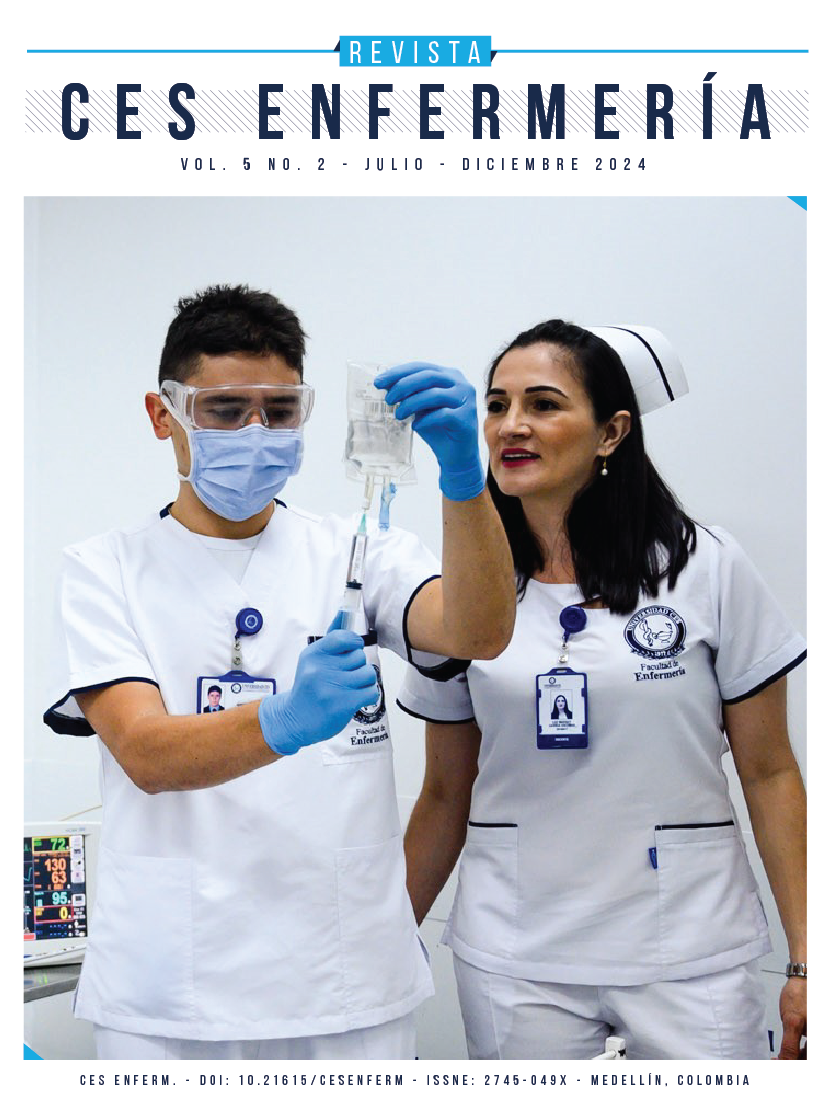Una aproximación al diseño “The best-fit framework synthesis of qualitative research”. Una revisión de tema
DOI:
https://doi.org/10.21615/cesenferm.7677Palabras clave:
Revisión sistemática, Síntesis marco, Práctica basada en la evidencia, Diseño, Investigación cualitativaResumen
La necesidad de comprender de forma profunda los fenómenos, explorar estos desde las perspectivas de los actores e identificar las áreas emergentes de la práctica y la investigación han motivado el desarrollo de una amplia gama de metodologías de revisiones sistemáticas de la evidencia cualitativa. Uno de los diseños emergentes es “The best-fit framework synthesis of qualitative research”; el cual se basa en un enfoque “combinado” de métodos de análisis deductivo e inductivo. Este diseño ha sido utilizado con éxito para realizar revisiones rápidas cuando se demandan repuestas para la toma de decisiones sobre las mejores opciones frente a una problemática de salud. El objetivo de este artículo de revisión de tema es proporcionar una aproximación a las características de este diseño, sus propósitos, ventajas y limitaciones; así como las fases o etapas que involucra su utilización.
Descargas
Referencias bibliográficas
Aromataris E, Pearson A. The systematic review: An overview. American Journal of Nursing. 2014;114(3):53-8. doi: 10.1097/01.NAJ.0000444496.24228.2C.
Aromataris E, Riitano D. Constructing a search strategy and searching for evidence. American Journal of Nursing. 2014;114(5):49-56. doi: 10.1097/01.NAJ.0000446779.99522.F6.
Chalmers I, Hedges L V., Cooper H. A Brief History of Research Synthesis. 2002;25(1):12-37. Doi: 101177/0163278702025001003.
Dixon-Woods M, Bonas S, Booth A, Jones DR, Miller T, Sutton AJ, et al. How can systematic reviews incorporate qualitative research? A critical perspective. 2006;6(1):27-44. doi: 101177/1468794106058867.
Munn Z, Stern C, Aromataris E, Lockwood C, Jordan Z. What kind of systematic review should I conduct? A proposed typology and guidance for systematic reviewers in the medical and health sciences. BMC Med Res Methodol. 2018;18(1). doi: 10.1186/S12874-017-0468-4.
Petticrew M, Rehfuess E, Noyes J, Higgins JPT, Mayhew A, Pantoja T, et al. Synthesizing evidence on complex interventions: how meta-analytical, qualitative, and mixed-method approaches can contribute. J Clin Epidemiol. 2013;66(11):1230–43. doi: /10.1016/j.jclinepi.2013.06.005.
Barnett-Page E, Thomas J. Methods for the synthesis of qualitative research: a critical review. BMC Med Res Methodol. 2009;9(1):59. doi: 10.1186/1471-2288-9-59.
Whittemore R, Chao A, Jang M, Minges KE, Park C. Methods for knowledge synthesis: An overview. Heart & Lung. 2014;43(5):453–61. doi: 10.1016/j.hrtlng.2014.05.014. Disponible en: https://pubmed.ncbi.nlm.nih.gov/25012634/
Bearman M, Dawson P. Qualitative synthesis and systematic review in health professions education. Med Educ. 2013;47(3):252–60. doi: 10.1111/MEDU.12092.
Janvrin ML, Korona-Bailey J, Koehlmoos TP. Re-examining COVID-19 Self-Reported Symptom Tracking Programs in the United States: Updated Framework Synthesis. JMIR Form Res. 2021;5(12). doi: 10.2196/31271.
Thomas J, Harden A. Methods for the thematic synthesis of qualitative research in systematic reviews. BMC Med Res Methodol. 2008;8(1):1–10. doi: 10.1186/1471-2288-8-45.
Campbell F, Weeks L, Booth A, Kaunelis D, Smith A. A scoping review found increasing examples of rapid qualitative evidence syntheses and no methodological guidance. J Clin Epidemiol. 2019;115:160-71. doi: 10.1016/j.jclinepi.2019.05.032.
Ritchie J, Spencer L. Qualitative data analysis for applied policy research. En: Bryman A, Burgess B, editors. Analyzing Qualitative Data. London: Routledge, 1994; p. 246.
Dixon-Woods M. Using framework-based synthesis for conducting reviews of qualitative studies. BMC Med. 2011;9(1):1–2. doi: 10.1186/1741-7015-9-39/METRICS.
Koehlmoos TP, Janvrin ML, Korona-Bailey J, Madsen C, Sturdivant R. COVID-19 Self-Reported Symptom Tracking Programs in the United States: Framework Synthesis. J Med Internet Res. 2020;22(10). doi: 10.2196/23297.
Stratil JM, Voss M, Arnold L. WICID framework version 1.0: criteria and considerations to guide evidence-informed decision-making on non-pharmacological interventions targeting COVID-19. BMJ Glob Health. 2020;5(11):3699. doi: 10.1136/BMJGH-2020-003699.
Sheridan Rains L, Johnson S, Barnett P, Steare T, Needle JJ, Carr S, et al. Early impacts of the COVID-19 pandemic on mental health care and on people with mental health conditions: framework synthesis of international experiences and responses. Soc Psychiatry Psychiatr Epidemiol. 2021;56(1):13. 10.1007/S00127-020-01924-7.
Carroll C, Booth A, Cooper K. A worked example of “best fit” framework synthesis: A systematic review of views concerning the taking of some potential chemopreventive agents. BMC Med Res Methodol. 2011;11. doi: 10.1186/1471-2288-11-29.
Gale NK, Heath G, Cameron E, Rashid S, Redwood S. Using the framework method for the analysis of qualitative data in multi-disciplinary health research. BMC Med Res Methodol. 2013;13(1):117. doi: 10.1186/1471-2288-13-117.
Shaw L, Nunns M, Briscoe S, Anderson R, Thompson Coon J. A “Rapid Best-Fit” model for framework synthesis: Using research objectives to structure analysis within a rapid review of qualitative evidence. Res Synth Methods. 2021;12(3):368–83. doi: 10.1002/JRSM.1462.
Carroll C, Booth A, Leaviss J, Rick J. “best fit” framework synthesis: Refining the method. BMC Med Res Methodol. 2013;13(1). doi: 10.1186/1471-2288-13-37.
Booth A, Carroll C. How to build up the actionable knowledge base: the role of “best fit” framework synthesis for studies of improvement in healthcare. BMJ Qual Saf. 2015;24(11):700–8. doi: 10.1136/bmjqs-2014-003642.
Boeije HR, Van Wesel F, Alisic E. Making a difference: towards a method for weighing the evidence in a qualitative synthesis. J Eval Clin Pract. 2011;17(4):657–63. doi: 10.1111/J.1365-2753.2011.01674.X.
Booth A, Carroll C. How to build up the actionable knowledge base: the role of “best fit” framework synthesis for studies of improvement in healthcare. BMJ Qual Saf. 2015;24(11):700–8. doi: 10.1136/bmjqs-2014-003642.
Damschroder LJ, Aron DC, Keith RE, Kirsh SR, Alexander JA, Lowery JC. Fostering implementation of health services research findings into practice: a consolidated framework for advancing implementation science. Implement Sci. 2009;4(1):50. doi: 10.1186/1748-5908-4-50.
Carroll C, Booth A, Leaviss J, Rick J. “best fit” framework synthesis: Refining the method. BMC Med Res Methodol. 2013;13(1). doi: 10.1186/1471-2288-13-37.
Descargas
Publicado
Cómo citar
Número
Sección
Licencia
Derechos de autor 2024 CES Enfermería

Esta obra está bajo una licencia internacional Creative Commons Atribución-NoComercial-CompartirIgual 4.0.



